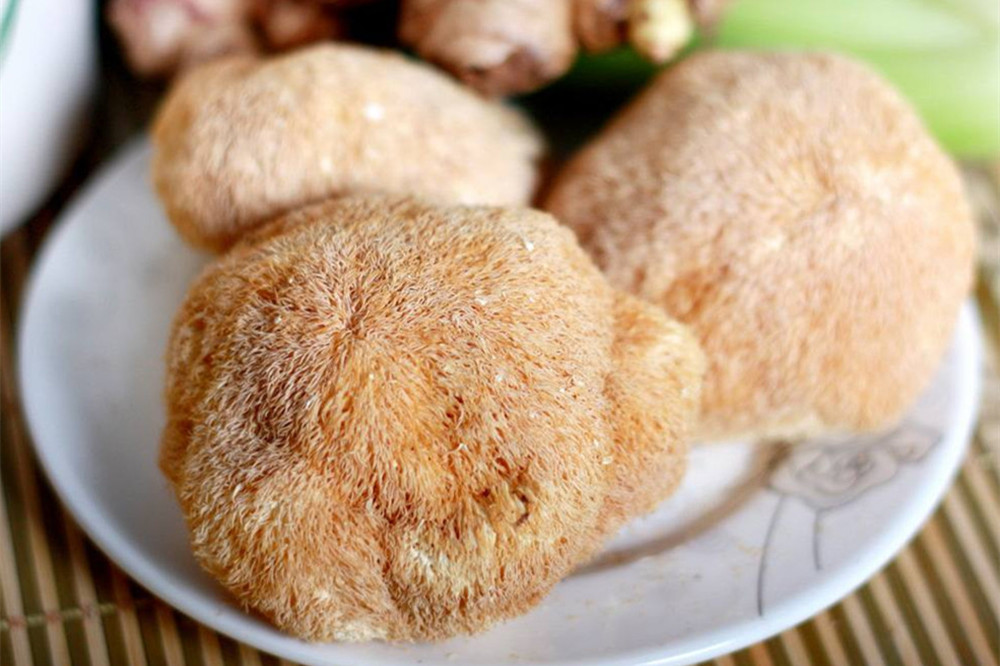Lion’s mane (Hericium erinaceus), also known as mountain-priest mushroom, bearded tooth fungus, is an edible mushroom that has a long history of use in East Asian medicine. The unique and fascinating fungi are native to North America, Europe, and Asia, known for its distinct appearance and robust health benefits. It has been found to contain compounds that may help improve memory and cognitive function. Additionally, it has anti-inflammatory and antioxidant properties that could have valuable implications for overall health. Whether used in cooking or as a supplement, the lion’s mane mushroom is an intriguing option for anyone looking to explore the world of medicinal mushrooms.
This amazing mushroom is rich in polysaccharides, oligosaccharides, sterols, terpenoids, phenols, adenosines, unsaturated fatty acids, proteins and peptides, these compounds offer various benefits and positive effects in humans. From improving cognitive function to promoting heart health, the potential of lion’s mane mushroom extract has been researched extensively over the past few years – with promising results! Now the lion’s mane mushroom extract is gaining a lot of attention for its impressive health-boosting properties. In this blog post, we’ll dive into the health benefits of Lion’s mane mushroom extract.
Health benefits of Lion’s mane mushroom extract
Anti-inflammatory properties
Anti-inflammatory properties Mushrooms have long been known for their numerous health benefits, including some that are truly remarkable. Recent studies have shown that one of the key benefits of mushrooms is their anti-inflammatory properties. Specifically, mushroom extracts have been shown to reduce inflammation in the body, which is a key factor in the development of many chronic diseases. Chronic inflammation is associated with a number of diseases, including heart disease, diabetes, cancer and autoimmune disorders (45Trusted Source). the anti-inflammatory properties of Lion’s mane mushroom extract have also helped reduce symptoms of these illnesses. So if you’re looking for a natural way to boost your health and fight inflammation, consider adding the mushroom extract to your daily routine.
Boost your immune system
Lion’s mane mushroom extract has been gaining popularity for its alleged immune-boosting properties. This is because the fruiting bodies and mycelium of these mushrooms contain a number of active compounds, including polysaccharides, erinacines, hericerins, steroids, alkaloids, and lactones. Recent studies have shown that the beta-glucans and polysaccharides in lion’s mane mushrooms can activate and enhance the immune system’s response to pathogens, making it a promising natural supplement for those looking to strengthen their immunity.
Lion’s mane mushroom extract is high in antioxidants, which help protect your body from damage caused by free radicals. It can also boost your immune system’s defenses, reducing your risk of illness. These changes can boost your immune system, helping your body respond to disease more effectively. In fact, lion’s mane mushroom extract may even be able to boost your immune response in people who have been diagnosed with inflammatory bowel disease (IBD).
Fig: Farmed Lion’s mane
Help improve cognitive function
This functional mushroom is a popular ingredient in natural health supplements and has even been linked to mental health benefits, such as improving brain function. Lion’s mane contains compounds called hericenones and erinacines, which are believed to stimulate the growth and production of Nerve Growth Factor (NGF) and improve brain function, which prevents existing neurons from dying and stimulates the growth of new ones. This mushroom extract may also help support a healthy inflammation response and promote cognitive function. As we age, it’s important to keep our minds sharp and functioning as well as possible. This unique mushroom has been studied for its potential benefits on brain health, and some research suggests that it may be able to enhance cognitive function. While more research is needed to fully understand the benefits of lion’s mane on cognitive function, it’s an intriguing avenue to explore for those looking to support their brain health.
Research has also shown that lion’s mane extract helps heal nerve damage, and it can decrease the recovery time of brain injury in animals. It can also speed up nerve regeneration after a stroke. The nervous system consists of the brain, spinal cord and other nerves that travel throughout the body to send and receive signals that control almost every bodily function. The lion’s mane mushroom extract can support the healthy function of this important organ by promoting the growth of nerve cells.
Anti-Depressant Effects
Lion’s mane mushroom extract has been shown to ease depression symptoms in both human and animal studies. In a study in mice, researchers found that the fungus’ anti-inflammatory properties reduced inflammation in the brain which can play a role in depression. Similarly, research on humans shows that lion’s mane mushrooms can boost the immune system by supporting natural immune responses and reducing oxidative stress. This can also help to restore the balance of chemical imbalances that may contribute to anxiety and depression.
The health benefits of lion’s mane extract is not just that mentioned above, some studies have shown that lion’s mane mushrooms help prevent the oxidation of cholesterol molecules in the bloodstream. This is good news for your heart health, as oxidized cholesterol can cause clogged arteries and increase the risk of a heart attack or stroke. In addition, lion’s mane mushroom extract may also help with digestive health and improve blood sugar control, reducing the risk of developing diabetes.
Fig: Lion’s mane dried
Side effect of lion’s mane extract
As with any supplement, it’s important to research the safety of lion’s mane mushrooms before taking them. This is especially true if you have a medical condition or are pregnant or breastfeeding. Although lion’s mane extract has gained popularity as a natural supplement, it does come with some potential side effects. One of the most common side effects reported is mild gastrointestinal discomfort, such as nausea, diarrhea, or stomach cramps. These symptoms usually subside within a few days of starting the supplement and are not severe or long-lasting. Because lion’s mane mushrooms slow blood clotting, they can interact with certain drugs that are used to treat vascular diseases, such as thrombolytic agents (blood thinners). These drugs, which are often used to reduce the risk of heart disease and stroke, will become more effective at preventing bleeding when paired with lion’s mane supplements or powder. However, it’s essential to consult with your healthcare professional before taking lion’s mane extract, especially if you have a history of allergies or digestive issues. Despite its potential side effects, many people swear by lion’s mane extract’s cognitive benefits and continue to use it on a regular basis.
- Dandelion Extract: What It Is, Benefits, Uses and Side Effect - April 23, 2024
- Is Berberine Extract Help For Weight Loss? - April 11, 2024
- Why Is Pysllium Husk Powder A Popular Meal Replacement Ingredient? - April 3, 2024





